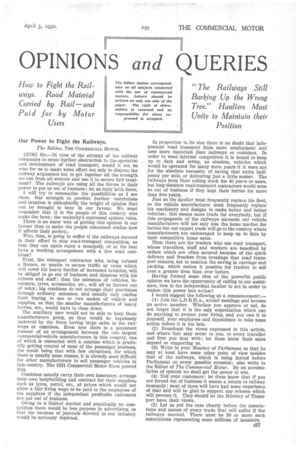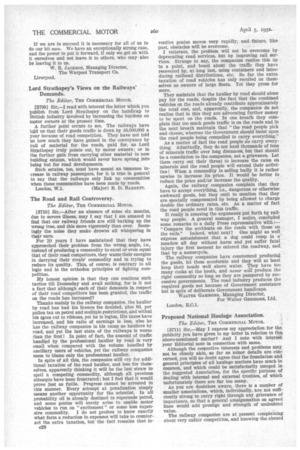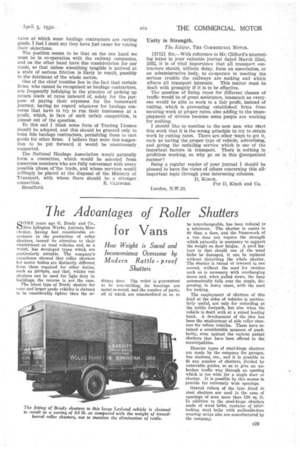OPINIONS and QUERIES Our Power to Fight the Railways.
Page 49

Page 50

Page 51

If you've noticed an error in this article please click here to report it so we can fix it.
The Editor, THE COMMERCIAL Moro&
[3708] Sir,—In view of the attempt of the railway companies to cause further obstruction to the operation and development of road transport, would it not be wise for us to make some effort not only to dispute the railway arguments but to get together all the strength we can from all sources and use it to secure fair treatment? The railways are using all the forces in their power to put us out of business ; let us reply )vith force.
I will try to summarize the possibilities as I see them. Our strength to prevent further restrictions and taxation is undoubtedly the weight of opinion that can be brought to bear In our favour. We must remember that it is the people of this country who make the laws ; the majority's expressed opinion rules.
There is no surer way of getting this opinion in our favour than to make the people concerned realize how it affects their pocket.
Who, then, is going to suffer if the railways succeed in their effort to stop road-transport competition, so that they can again enjoy a monopoly, or at the best have a working arrangement with a few road combines?
First, the transport contractor who, being refused a licence, or unable to secure traffic at rates which will cover his heavy burden of increased taxation, will be obliged to go out of business and dispense with his drivers and staff ; then the salesmen of vehicles, insurance, tyres, accessories, etc., will all be thrown out of wOrk ; big combines do not arrange their purchases through ordinary salesmen, and usually they confine their buying to one or two makes of vehicle and supplies, so that the smaller manufacturers of heavy lorries, etc., would have to close down.
The auxiliary user would not be able to keep these manufacturers going, as they would be hopelessly undercut by the firms having large sales to the railways or combines. Even now there is. a persistent rumour of an arrangement between the two largest commercial-vehicle manufacturers in this country, one of which is connected with a combine which is gradually getting control of most of the passenger business, the result being that with few exceptions, for which there is usually some reason, it is already most difficult for other manufacturers to sell passenger vehicles in this country. The 1031 Commercial Motor Show proved this.
combines usually carry their own insurance, arrange their own bodybuilding and contract for their supplies, such as tyres, petrol, etc., at prices which would not allow a fair living wage to be paid to the employees of the suppliers if the independent profitable customers are put out of business.
Owing to a limited market and practically no competition there would be less purpose in advertising, so that the revenue of journals devoted to our industry would be seriously depleted.
In proportion to its size there is no doubt that independent road transport finds more employment and uses more materials than railways or combines. In order to meet internal competition it is bound to keep
, up to date and scrap, as obsolete, vehicles which would be operated for many more years if it were not for the absolute necessity of saving that extra halfpenny per mile, or delivering just a little sooner. The railways keep their rolling stock for 40 years or more, but long-distance road-transport contractors would soon be out of business if they kept their lorries for more than five years.
Just as the haulier must frequently replace his fleet, so the vehicle manufacturer must frequently replace his machinery and designs to make better and better vehicles ; this means more trade for everybody, but if this propaganda of the railways succeeds our vehicle manufacturers will not only lose the home market for lorries but our export trade will go to the country where manufacturers are encouraged to keep up to date by their competitive home sales.
Then there are the traders who use road transport, whose travellers, staff and workers are benefited by orders which are often secured because of the quick delivery and freedom from breakage that road transport ensures, not to mention the saving in carriage and packing, which makes it possible for traders to sell over a greater area than ever before.
Having formed some idea of the powerful public opinion we have the opportunity of calling to our assistance, how is the independent haulier to act in order to waken this power into action?
I would suggest the following as a commencement : (1) Join the L.D.R.H.A., attend meetings and become an active member. Whether you approve or not, do not forget that it is the only organization which can do anything to protect your living, and you owe it to yourself, your employees and dependents to take some action before it is too late.
(2) Broadcast the views expressed in this article, and others that may occur to you, to every traveller and firm you deal with ; let them know their sales depend on supporting us.
(3) Write to your Member of Parliament so that he may at least have some other point of view besides that of the railways, which is being forced before Parliament on every possible occasion; also write to the Editor of The Commercial Motor. By an accumulation of opinion we shall get the power to win.
(4) Tell your customers; let them know that if you are forced out of business it means a return to railway monopoly ; most of them will have had some experience of that and will be glad to support any scheme which will prevent it. They should let the Ministry of Transport have their views.
(5) Let us put the case clearly before the associations and unions of every trade that will suffer if the railways succeed. There must be 30 or more such associations representing some millions of members. If we are to succeed it is necessary for all of us to do our bit now. We have an exceptionally strong case, and the power to put it forward, if only we get on with it ourselves and not leave it to others, who may also be leaving it to us.
W. R. JACKSON, Managing Director, The Warpool Transport Co.
Liverpool.
Lord Strathspey's Views on the Railways' Demands.
The Editor, THE COMMERCIAL MOTOR.
[3709] Sir,—I read with interest the letter which you publish from Lord Strathspey on the handicap to British industry involved by increasing the burdens on motor owners at the present time
A further point occurs to me. The railways have Mid us that their goods traffic is clown by £6,000,000 a year because of road competition. They have not told us how much they have gained in the conveyance by rail of material for the roads, paid for, as Lord Strathspey truly points out, by motor owners ; or in the further gain from carrying other material to new building estates, which would never have sprung into being but for road developments.
Such estates, too, must have meant an immense increase in railway passengers, for it is true in general to say that the railways only link up communities when these communities have been made by roads.
London, W.1. (Major) R. D. BARRETT.
The Road and Rail Controversy.
The Editor, THE COMMERCIAL MOTOR.
[3710] Sir,—After an absence of some six months, due to severe illness, may I say that I am amazed to find that our railway friends are still barking up the wrong tree, and this more vigorously than ever. Seemingly the noise they make drowns all whispering in their ears.
For 20 years I have maintained that they have approached their problem from the wrong angle, i.e., instead of producing a commodity to excel or even equal that of their road competitors, they waste their energies in decrying their rivals' commodity and in trying to reduce its quality. This, of course, is contrary to all logic and to the orthodox principles of fighting competition.
My honest opinion is that they can continue such tactics till Doomsday and avail nothing, for is it not a fact that although each of their demands in respect of their road competitors has been granted, the traffic on the roads has increased?
Thanks mainly to the railway companies, the haulier by road has had his licence fee doubled, plus 8d. per gallon tax on petrol and multiple restrictions, and withal his rates cut to ribbons, yet he is legion. His taxes have increased, and his ratio of earnings is less, also he has the railway companies in his camp as hauliers by road, and yet the last state of the railways is worse than the first! In point of fact, the amount of traffic handled by the professional haulier by road is very small when compared with the volume handled by ancillary users of vehicles, yet the railway companies seem to blame only the professional haulier.
In spite of all this, the companies still cry for additional taxation of the road haulier, and less for themselves, apparently thinking it will be the last straw to spoil a competing commodity, although all previous attempts have been frustrated; but I feel that it would prove just as futile. Progress cannot be arrested in this manner. Every attempt at penalization simply means another opportunity for the scientist. In all probability oil is already destined to supersede petrol, and some genius will surely arise to enable motor vehicles to run on " excitement " or some less expensive commodity. I do not profess to know exactly what form a reduction in expenses will take to counteract the extra taxation, but the fact remains that in
028
ventive genius moves very rapidly, and -future, like past, obstacles will be overcome.
I reiterate, the problem will not be overcome by deprecating road services, but by improving rail services. Strange to say, the companies realize this up to a point, and boast about the traffic they have recovered by, at long last, using containers and introducing railhead distributions, etc. So far the extra taxation of road vehicles has only recoiled on themselves as owners of large fleets. Yet they press for more.
They maintain that the haulier by road should alone pay for the roads, despite the fact that the combined vehicles on the roads already contribute approximately the total cost, and, apparently, the companies do not realize that in this they are advocating further money to be spent on the roads. In one breath they complain that too much goods traffic is on the roads and in the next breath maintain that "the road people pick and choose, whereas the Government should insist upon the road people being compelled to carry everything."
As a matter of fact the road people do carry everything. Admittedly, they do not haul thousands of tons of minerals traffic over long distances, but that should be a consolation to the companies, not a grievance. Let them carry out their threat to increase the rates on minerals and the road people will extend their activities! When a commodity is selling badly it is rather unwise to increase its price. It would be better to reduce the price and/or increase the quality.
Again, the railway companies complain that they have to accept everything, i.e., dangerous or otherwise awkward goods, but they omit to mention that they are specially compensated by being allowed to charge double the ordinary rates, etc. As a matter of fact the road people revel in this traffic. It really is amazing the arguments put forth by railway people. A general manager, I notice, concluded some remarks to a daily Press representative with :— " Compare the accidents on the roads with those on the rails." Indeed, what next? One might as well express astonishment that a dog could romp in meadow all day without harm and yet suffer fatal injury the first moment he entered the roadway, and that by a motorcycle.
The railway companies have commenced producing the goods, let them accelerate and they will at least keep their heads well above water. They have too many cooks at the broth, and never will produce the right commodity so long as they are pampered by successive governments. The road industry produces the required goods not because of Government assistance but in spite of deliberate Government handicaps.
WALTER GAMMONS, Managing Director, For Walter Gammons, Ltd. London, E.C.1.
Proposed National Haulage Association.
The Editor, THE COMMERCIAL -MOTOR.
[3711] Sir,—May I express my appreciation for the publicity you have given to my letter in relation to theE above-mentioned matter? And I note with interestyour Editorial note in connection with same.
Although the respective interests and problems may not be closely akin, so far as minor details are concerned, you will no doubt agree that the foundation and general principles of all haulage matters have much in common, and which could be satisfactorily merged in the suggested Association, for the specific purpose of dealing with internal and external troubles, of which unfortunately there are far too many.
As you are doubtless aware, there is a number of smaller associations, which, individually, are not sufficiently strong to carry right through any grievance of importance, so that a general amalgamation on agreed lines would add prestige and strength of undoubted value.
The railway companies are at present complaining about very unfair competition, and knowing the absurd rates at which some haulage contractors arc carting goods, I feel I must say they have just cause for voicing their objections.
The position seems to be that on the one hand we must be in co-operation with the railway companies, and on the other hand have due consideration for our trade, so that unless something tangible is arrived at a state of serious friction is likely to result, possibly to the detriment of the whole nation.
One of the chief troubles lies in the fact that certain firms, who cannot be recognized as haulage contractors, are frequently indulging in the practice of picking up return loads at rates unheard of, solely for the purpose of paying their expenses for the homeward journey, having no regard whatever for haulage concerns that have to try to run their businesses at a profit, which, in face of such unfair competition, is almost out of the question.
To this end I think some form of Trading Licence should be adopted, and this should be granted only to bona fide haulage contractors, permitting them to cart goods for other firms. I believe that were this suggestion to be put forward it would be unanimously supported.
The National Haulage Association would naturally form a committee, which would be selected from numerous members who are fully conversant with every possible phase of-the trade, and whose services would willingly be placed at the disposal of the Ministry of Transport, with whom there should be a stronger.
connection. E. CLIFFORD. Brentford.
Unity is Strength.
The Editor, THE COMMERCIAL MOTOR.
[3712] Sir,—With reference to Mr. Clifford's interesting letter in your valuable journal dated March 22nd, 1932, it is of vital importance that all transport contractors should, without delay, form an association, or an administrative body, to co-operate in meeting the serious trouble the railways are making and which affects all transport interests. This matter must be dealt with promptly if it is to be effective.
The question of fixing rates for different classes of traffic would be of great assistance, inasmuch as everyone would be able to work to a fair profit, instead of cutting, which is preventing established firms from securing work at proper rates, also adding to the unemployment of drivers because some people are working for nothing.
I should like to mention to the new men who start this work that it is the wrong principle to try to obtain work by cutting rates. There are other ways to get it, such as having the proper type of vehicle, advertising, and giving the unfailing service which is one of the important factors in transport. 'There is nothing in profitless working, so why go on in this 'disorganized manner?
Being a regular reader of your journal I should be pleased to have the views of others concerning this allimportant topic through your interesting columns.
D. KINOH,
For D. Kinch and Co. . London, N.W.10.












































































































